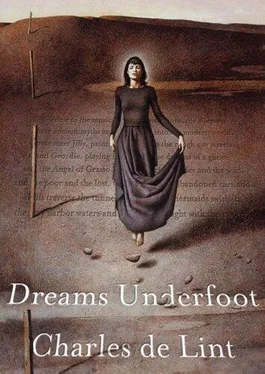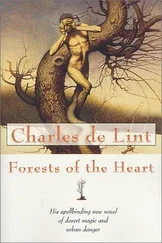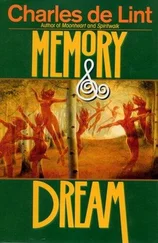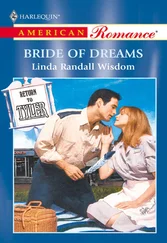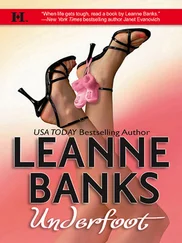“When did you find out who your sponsor was?”
“When I graduated. He was at the ceremony.”
“Was it weird finally meeting him?”
Jilly laughed. “Yes and no. I’d already known him for years—he was my art history professor. We got along really well and he used to let me use the sunroom at the back of his house for a studio. Angel and Lou had shown him some of that bad art I’d been doing when I was still on the street and that’s why he sponsored me—because he thought I had a lot of talent, he told me later. But he didn’t want me to know it was him putting up the money because he thought it might affect our relationship at Butler U.”
She shook her head. “He said he knew I’d be going the first time Angel and Lou showed him the stuff I was doing.”
“It’s sort of like a fairy tale, isn’t it?” Annie said.
“I guess it is. I never thought of it that way.”
“And it really works, doesn’t it?”
“If you want it to,” Jilly said. “I’m not saying it’s easy. There’s ups and downs—lots more downs at the start.”
“How many kids make it?”
“This hasn’t got anything to do with statistics,” Jilly said. “You can only look at it on a person to person basis. But Angel’s been doing this for a long, long time. You can trust her to do her best for you.
She takes a lot of flak for what she does. Parents get mad at her because she won’t tell them where their kids are. Social services says she’s undermining their authority. She’s been to jail twice on contempt of court charges because she wouldn’t tell where some kid was.”
“Even with her boyfriend being a cop?”
“That was a long time ago,” Jilly said. “And it didn’t work out. They’re still friends but—Angel went through an awful bad time when she was a kid. That changes a person, no matter how much they learn to take control of their life. Angel’s great with people, especially kids, and she’s got a million friends, but she’s not good at maintaining a personal relationship with a guy. When it comes down to the crunch, she just can’t learn to trust them. As friends, sure, but not as lovers.”
“She said something along the same lines about you,” Annie said. “She said you were full of love, but it wasn’t sexual or romantic so much as a general kindness towards everything and everybody.”
“Yeah, well ... I guess both Angel and I talk too much.”
Annie hesitated for a few heartbeats, then said, “She also told me that you want to sponsor me.”
Jilly nodded. “I’d like to.”
“I don’t get it.”
“What’s to get?”
“Well, I’m not like you or your professor friend. I’m not, you know, all that creative. I couldn’t make something beautiful if my life depended on it. I’m not much good at anything.”
Jilly shook her head. “That’s not what it’s about. Beauty isn’t what you see on TV or in magazine ads or even necessarily in art galleries. It’s a lot deeper and a lot simpler than that. It’s realizing the goodness of things, it’s leaving the world a little better than it was before you got here. It’s appreciating the inspiration of the world around you and trying to inspire others.
“Sculptors, poets, painters, musicians—they’re the traditional purveyors of Beauty. But it can as easily be created by a gardener, a farmer, a plumber, a careworker. It’s the intent you put into your work, the pride you take in it—whatever it is.”
“But still .... I really don’t have anything to offer.”
Annie’s statement was all the more painful for Jilly because it held no selfpity, it was just a laying out of facts as Annie saw them. “Giving birth is an act of Beauty,” Jilly said.
“I don’t even know if I want a kid. I ... I don’t know what I want. I don’t know who I am.”
She turned to Jilly. There seemed to be years of pain and confu—
sion in her eyes, far more years than she had lived in the world. When had that pain begun? Jilly thought. Who could have done it to her, beautiful child that she must have been? Father, brother, uncle, family friend?
Jilly wanted to just reach out and hold her, but knew too well how the physical contact of comfort could too easily be misconstrued as an invasion of the private space an abused victim sometimes so desperately needed to maintain.
“I need help,” Annie said softly. “I know that. But I don’t want charity.”
“Don’t think of this sponsorship program as charity,” Jilly said. “What Angel does is simply what we all should be doing all of the time—taking care of each other.”
Annie sighed, but fell silent. Jilly didn’t push it any further. They sat for awhile longer on the stoop while the world bustled by on Grasso Street.
“What was the hardest part?” Annie asked. “You know, when you first came off the street.”
“Thinking of myself as normal.”
8
Daddy’s Home, by Isabelle Copley. Painted Wood. Adjani Farm, Wren Island, 1990.
The sculpture is three feet high, afiat rectangle of solid wood, standing on end with a child’s face, upper torso and hands protruding from one side, as though the wood is gauze against which the subject is pressing. The child wears a look of terror.
Annie’s sleeping again. She needs the rest as much as she needs regular meals and the knowledge that she’s got a safe place to stay. I took my Walkman out onto the fire escape and listened to a copy of the tape that Angel played for her today. I don’t much recognize that kid either, but I know it’s me.
It’s funny, me talking about Angel, Angel talking about me, both of us knowing what the other needs, but neither able to help herself. I like to see my friends as couples. I like to see them in love with each other. But it’s not the same for me.
Except who am I kidding? I want the same thing, but I just choke when a man gets too close to me. I can’t let down that final barrier, I can’t even tell them why.
Sophie says I expect them to just instinctively know. That I’m waiting for them to be understanding and caring without ever opening up to them. If I want them to follow the script I’ve got written out my head, she says I have to let them in on it.
I know she’s right, but I can’t do anything about it.
I see a dog slink into the alleyway beside the building. He’s skinny as a whippet, but he’s just a mongrel that no one’s taken care of for awhile. He’s got dried blood on his shoulders, so I guess someone’s been beating him.
I go down with some cat food in a bowl, but he won’t come near me, no matter how soothingly I call to him. I know he can smell the food, but he’s more scared of me than he’s hungry. Finally I just leave the bowl and go back up the fire escape. He waits until I’m sitting outside my window again before he goes up to the bowl. He wolfs the food down and then he takes off like he’s done something wrong.
I guess that’s the way I am when I meet a man I like. I’m really happy with him until he’s nice to me, until he wants to kiss me and hold me, and then I just run off like I’ve done something wrong.
9
Annie woke while Jilly was starting dinner. She helped chop up vegetables for the vegetarian stew Jilly was making, then drifted over to the long worktable that ran along the back wall near Jilly’s easel.
She found a brochure for the Five Coyotes Singing Studio show in amongst the litter of paper, magazines, sketches and old paint brushes and brought it over to the kitchen table where she leafed through it while Jilly finished up the dinner preparations.
“Do you really think something like this is going to make a difference?” Annie asked after she’d read through the brochure.
Читать дальше
